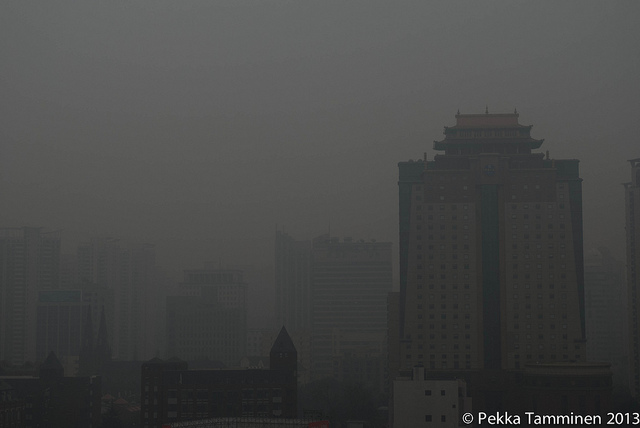Podcast: Play in new window | Download
Subscribe: RSS
Unbridled air pollution has reached such concentrations in Beijing and six of China’s northern provinces that breathing and photosynthesis have become almost impossible. In addition, landing airplanes, driving cars, and seeing anything, have become extremely difficult in an epic smog concentration that has persisted for more than a week. According to the Shanghai Academy of Social Sciences — the second largest academic institution in the country — the capital city is virtually “uninhabitable for human beings.”
The concentration of one of the most dangerous components of smog — tiny particles so small they pass through the lungs directly into the bloodstream — has reached 20 times the level considered to be the upper limit of safe exposure by the World Health Organization. Virtually no one goes outside without a surgical mask in place. When Chinese President Xi Jinping did a walkabout in a trendy tourist area the other day, without a mask, apparently to demonstrate how bracing the murky air really is, instead of instilling renewed confidence he raised serious questions about his mental health.
And it gets worse. Not only the smog, but comprehension of the damage it’s doing. A study by the China Agricultural University shows that when smog is as thick as it is now, photosynthesis virtually stops. Unless pollution is reduced dramatically and immediately, according to the lead researcher, Chinese agriculture will be crippled and conditions in much of the country will resemble “nuclear winter” — the aftermath of a global nuclear war.
China is also beset by other titanic problems (pun intended) such as water pollution, land erosion and contamination and energy shortages — all of which derive from unrestrained industrial expansion — that may well bring the country down before it has had the chance to experience the effects of global warming. Should that happen, it will serve to remind us, just before we go under, that climate change is not the source of our troubles, just one of the many effects of industrial pollution. Climate-change deniers are pollution advocates.
China, unlike some other countries that could be named, is not going down without a fight. Just the other day the government in Beijing courageously confiscated and destroyed 500 outdoor barbecues. That ought to do it.
Such strains as these conditions are imposing on life in China cannot be borne for long. As with Egypt, Iran, Venezuela and probably India and Pakistan, the government has let the illness progress to the point that any cure will be almost as painful and destructive as the disease.
[It is a law of industrial journalism that all pieces such as this one must end with a hopeful note, an expression of faith in technology. So here goes.] With luck, and with a large helping of its trademark combination of ingenuity and brutally hard work, China may well survive long enough to be destroyed by climate change. But it’s going to be close.
